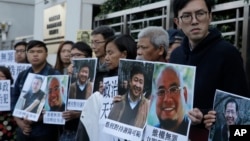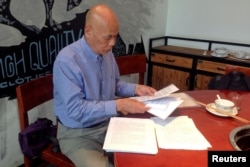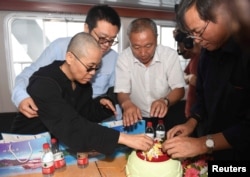Prominent Chinese rights activist Wu Gan, a blogger who goes by the nickname “Super Vulgar Butcher” as he mocked corrupt officials as pigs, has sought to appeal his eight-year prison sentence after being found guilty of subverting state power.
In his petition to the high court in Tianjin, the outspoken rights defender argued that “people have every right to subvert state power” since article two of China’s Constitution stipulates “all power belongs to the people,” local media reported.
Wu, who turns 45 next month, demanded the court overturns its guilty verdict on him as he has done nothing wrong but exercise his constitutional rights.
“He has done no harm to the society. Instead, what he has said or done has promoted public awareness toward their civil rights… while serving to reserve many miscarriage of justice cases,” read his petition as cited by local media.
Wu appeals
On January 4, Ge Yongxi, one of Wu’s two lawyers, tweeted and confirmed that Wu had drafted his own petition and filed his appeal to the court the previous day.
During their two-hour meeting, Wu appeared to be at ease with smiles on his face, saying he has no regrets, according to Ge.
Both Ge and Yan Xin, the other lawyer, however, weren’t available Thursday to comment on the upcoming proceedings of Wu’s trial.
Wu also petitioned the judiciary to recommend the National People’s Congress to either amend or nullify subversion-related charges and punishments as stipulated by article 105 of the nation’s Criminal Law.
People’s rights to subvert
The rights advocate, who was arrested in May 2015 in southeastern China, had become known for mocking political officials in a long-running campaign against corruption and abuse of power.
His advocacy had combined spirited speech, satire and humor online as well as street performance. In one occasion, he posed for online portraits brandishing knives that he said he would use to "slaughter the pigs'' among local officials who'd done wrong.
But following a secret trial in August, a court in Tianjin in late December ruled Wu tried to "overthrow state power and the socialist system" through a series of "criminal” actions, including spreading statements to attack state power and insult people online.
Eight-year sentence
Wu, who refused to plead guilty, was sentenced to eight years in prison — the longest to date among those tied to a sweeping crackdown in July 2015 on rights lawyers.
But Wu himself took it lightly, calling the conviction “the highest form of affirmation for a citizen.”
Wu was allegedly offered a reduced three-year jail term had he agreed to plead guilty.
Observers said Wu’s appeal is of great significance although it stands no chance of success.
Political unfairness
“These appeals are always rejected. They’re done in order to show what happens when [there’s] an appeal inside this system. And it’s just another way to show that political unfairness of the system,” said Perry Link, a China expert and professor at the University of California, Riverside.
The professor called Wu a bold and courageous man, who has stood up against the authoritarian rule as did late Nobel Laureate Liu Xiaobo.
Both the U.S. and German governments, as well as international rights groups, have called on the Chinese authorities to respect their international human rights obligations and commitments by immediately releasing Wu.
The group Chinese Human Rights described Wu as “a victim of injustice and mistreatment,” whose conviction it argued was a “blatant violation of his universal right for free expression and peaceful assembly.”
A victim of injustice
While Wu’s fight for justice has cost him his own freedom, both his appeal and earlier refusal to plead guilty have challenged the government’s narrative about rights campaigners.
The rights group’s researcher Frances Eve said that, as a creative cyber-activist, Wu has set an example to inspire many more to follow suit and stand up against social injustice.
“He is a symbol for the fact that the government is failing to address these social issues and as it continues to fail and jails activists, it is ignoring the fact that more people like him will pop up and will use this tool [internet]”… to take up a similar advocate role, Eve said.
On Twitter, Huang Yuhui from Mayang of China’s southern Hunan province threw her support behind Wu.
She said Wu was the one who had helped her family’s forced eviction case and sided with those socially-disadvantaged people like herself.
“We will never forget the Butcher. Brother Wu is innocent. Set him free immediately,” Huang tweeted.


